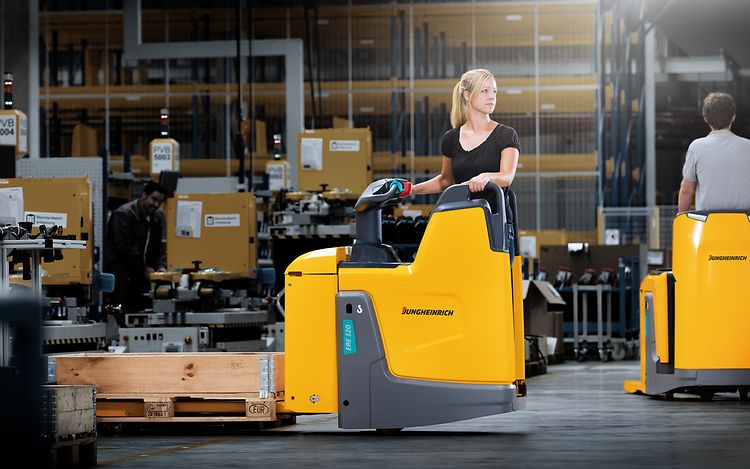Xe nâng điện đã trở thành một phần không thể thiếu trong các hoạt động kho bãi và công nghiệp hiện đại. Sự chuyển đổi từ ắc quy chì-axit truyền thống sang công nghệ lithium-ion đánh dấu một bước nhảy vọt về hiệu quả, bền vững và năng suất hoạt động. Tuy nhiên, nhiều ngành công nghiệp mới chỉ khai thác được một phần nhỏ những gì ắc quy lithium có thể mang lại. Bài viết này đi sâu hơn vào những lợi ích đã được biết đến, làm sáng tỏ những ưu điểm độc đáo, cơ hội bị bỏ qua và những insight thực tiễn để tối đa hóa tiềm năng của xe nâng chạy bằng lithium.
1. Tăng thời gian hoạt động nhờ sạc nhanh
Một trong những tính năng nổi bật của pin lithium Khả năng sạc nhanh là điểm mạnh của chúng. Khác với ắc-quy chì-axit, vốn yêu cầu thời gian sạc và làm mát kéo dài, ắc-quy lithium có thể đạt mức sạc đáng kể trong vòng chưa đầy một giờ. Khả năng sạc nhanh này cho phép người vận hành lên lịch các khoảng nghỉ ngắn để sạc, loại bỏ nhu cầu sử dụng ắc-quy dự phòng và giảm thiểu thời gian ngừng hoạt động.
Đối với các kho hàng hoạt động theo lịch trình chặt chẽ, điều này có nghĩa là xe nâng có thể hoạt động liên tục lâu hơn, từ đó nâng cao năng suất tổng thể. Pin lithium cũng hỗ trợ sạc cơ hội—sạc bổ sung trong thời gian xe không hoạt động—điều này đặc biệt hữu ích trong các hoạt động ca làm việc liên tục.
2. Khả năng chịu nhiệt trong các môi trường đa dạng
Xe nâng thường hoạt động trong các môi trường khắc nghiệt, từ các kho lạnh có nhiệt độ cực thấp đến các kho hàng nóng ẩm. Pin lithium thể hiện ưu thế trong điều kiện này nhờ hệ thống quản lý nhiệt độ vượt trội. Khác với pin chì-axit mất hiệu suất ở nhiệt độ thấp, pin lithium duy trì hiệu suất ổn định, khiến chúng trở thành lựa chọn lý tưởng cho các ngành như logistics thực phẩm và dược phẩm.
Các nhà điều hành có thể tin tưởng vào pin lithium để cung cấp nguồn điện đáng tin cậy mà không cần đến cơ sở hạ tầng sưởi ấm hoặc làm mát bổ sung, từ đó giảm thiểu độ phức tạp và chi phí vận hành.
3. Tối ưu hóa không gian: Lợi thế ẩn
Diện tích kho bãi đang trở nên khan hiếm, và pin lithium giúp thu hồi diện tích sàn quý giá. Hệ thống pin truyền thống yêu cầu các phòng sạc lớn có hệ thống thông gió để quản lý khí thải nguy hiểm. Ngược lại, pin lithium không phát ra khí thải và có thể được sạc tại các vị trí nhỏ gọn, phân tán.
Lợi ích tiết kiệm không gian này cho phép các kho hàng dành thêm diện tích cho việc lưu trữ hàng hóa hoặc các hoạt động sản xuất, từ đó tăng khả năng hoạt động mà không cần mở rộng diện tích vật lý.
4. Các tính năng an toàn nâng cao để tăng cường sự tự tin cho người vận hành
An toàn là ưu tiên hàng đầu trong hoạt động kho bãi, và pin lithium giải quyết vấn đề này thông qua các cơ chế an toàn tiên tiến. Hệ thống quản lý pin tích hợp (BMS) theo dõi các thông số như nhiệt độ, điện áp và mức sạc theo thời gian thực, ngăn ngừa các rủi ro như quá nhiệt hoặc sạc quá mức.
Các pin này cũng có khả năng chống tràn và không chứa axit độc hại, giúp giảm thiểu nguy cơ trong quá trình vận hành và bảo trì. Đối với người vận hành, điều này mang lại trải nghiệm an toàn và thân thiện hơn với người dùng.
5. Bền vững môi trường và kinh tế
Khi bền vững trở thành ưu tiên hàng đầu của các ngành công nghiệp, pin lithium mang lại cả lợi ích môi trường và kinh tế. Tuổi thọ dài hơn của chúng—thường gấp ba đến năm lần so với pin chì-axit—giúp giảm thiểu rác thải và hạ thấp tổng chi phí sở hữu.
Pin lithium cũng có hiệu suất năng lượng cao hơn, chuyển đổi một tỷ lệ cao hơn của năng lượng thành điện năng sử dụng được. Hiệu suất này không chỉ giúp giảm chi phí điện năng mà còn phù hợp với mục tiêu bền vững của doanh nghiệp, khiến chúng trở thành lựa chọn thân thiện với môi trường cho các doanh nghiệp quan tâm đến bảo vệ môi trường.
Giới thiệu về RICHYE
RICHYE là nhà sản xuất pin lithium chuyên nghiệp, nổi tiếng với chất lượng, hiệu suất và an toàn vượt trội. Với công nghệ tiên tiến và cam kết đổi mới, RICHYE cung cấp pin lithium vượt trội so với các đối thủ cạnh tranh trên mọi phương diện, từ độ bền, độ tin cậy đến hiệu quả chi phí. Được tin cậy bởi các ngành công nghiệp trên toàn thế giới, RICHYE là đối tác đáng tin cậy của bạn trong việc thúc đẩy một tương lai bền vững.
6. Giảm bớt phiền phức trong việc bảo trì
Pin lithium giúp đơn giản hóa đáng kể các yêu cầu bảo trì so với pin chì-axit. Không cần phải thay nước định kỳ, vệ sinh hoặc sạc cân bằng, chúng giúp tiết kiệm thời gian quý báu cho nhân viên vận hành và đội ngũ bảo trì.
Giảm thiểu công tác bảo trì không chỉ giúp giảm chi phí lao động mà còn loại bỏ rủi ro do lỗi con người, chẳng hạn như tưới quá nhiều nước, có thể gây hư hỏng cho ắc quy truyền thống. Đối với các nhà quản lý đội xe, điều này đồng nghĩa với việc ít gián đoạn hoạt động hơn và thiết bị có tuổi thọ lâu hơn.
7. Tận dụng các thông tin dựa trên dữ liệu
Hệ thống pin lithium hiện đại được trang bị công nghệ thông minh cung cấp thông tin hữu ích. Hệ thống quản lý pin thu thập và truyền tải dữ liệu về mô hình sử dụng, chu kỳ sạc và tình trạng sức khỏe của pin.
Quản lý đội xe có thể sử dụng dữ liệu này để tối ưu hóa việc sử dụng pin, lên lịch bảo trì chủ động và kéo dài tuổi thọ pin. Đối với các hoạt động quy mô lớn, mức độ thông tin chi tiết này giúp tối ưu hóa quy trình làm việc và cải thiện quản lý chi phí.
8. Chuẩn bị cho tương lai với công nghệ mới nổi
Khi ngành công nghiệp xe nâng tiếp tục phát triển, pin lithium đang được định vị để tích hợp một cách mượt mà với các công nghệ mới nổi. Từ tự động hóa đến kết nối IoT, những loại pin này cung cấp nguồn năng lượng và tính linh hoạt cần thiết để hỗ trợ các hệ thống xe nâng tiên tiến.
Ví dụ, xe tự hành (AGVs) và xe nâng tự động (autonomous forklifts) được hưởng lợi từ hiệu suất ổn định và mật độ năng lượng cao của pin lithium. Bằng cách áp dụng công nghệ lithium ngay từ bây giờ, các doanh nghiệp có thể chuẩn bị cho làn sóng đổi mới tiếp theo mà không cần phải nâng cấp đáng kể.
9. Giải pháp tùy chỉnh cho các nhu cầu đa dạng
Một trong những ưu điểm nổi bật của pin lithium là khả năng thích ứng với các yêu cầu vận hành khác nhau. Các nhà sản xuất như RICHYE cung cấp các giải pháp pin tùy chỉnh phù hợp với các mô hình xe nâng cụ thể, yêu cầu tải trọng và điều kiện môi trường.
Tùy chỉnh này đảm bảo hiệu suất tối ưu và tối đa hóa lợi nhuận trên vốn đầu tư. Dù bạn đang vận hành một đội xe nâng nhỏ trong kho hàng khu vực hay quản lý trung tâm phân phối toàn cầu, pin lithium có thể được tùy chỉnh để đáp ứng chính xác nhu cầu của bạn.
10. Xây dựng khả năng chống chịu trong hoạt động chuỗi cung ứng
Dịch bệnh COVID-19 đã làm nổi bật tầm quan trọng của các chuỗi cung ứng có khả năng chống chịu. Pin lithium Góp phần vào sự linh hoạt này bằng cách đảm bảo hoạt động liên tục của xe nâng, ngay cả trong những thời điểm nhu cầu cao.
Khả năng sạc nhanh và hoạt động ổn định qua nhiều ca làm việc giúp giảm thiểu rủi ro trễ hẹn và tắc nghẽn. Đối với các ngành như thương mại điện tử và bán lẻ, độ tin cậy này là yếu tố quan trọng để đáp ứng kỳ vọng của khách hàng.
Phần kết luận
Pin lithium đang thay đổi cách thức hoạt động của xe nâng điện, mang lại sự kết hợp giữa hiệu quả, an toàn và bền vững mà pin truyền thống không thể sánh kịp. Những ưu điểm của chúng không chỉ dừng lại ở những tính năng cơ bản, mà còn mang lại những lợi ích cụ thể giúp nâng cao năng suất, giảm chi phí và đảm bảo hoạt động bền vững trong tương lai.
Đối với các doanh nghiệp mong muốn duy trì sự cạnh tranh trong bối cảnh thị trường thay đổi nhanh chóng, đầu tư vào công nghệ lithium không chỉ là một lựa chọn thông minh—đó là bước đi cần thiết để đạt được sự xuất sắc trong hoạt động. Với sự dẫn dắt của các đối tác đáng tin cậy như RICHYE, việc chuyển đổi sang pin lithium chưa bao giờ dễ dàng và mang lại tác động lớn đến vậy.




